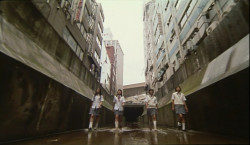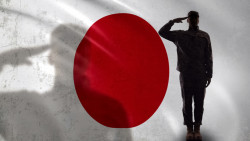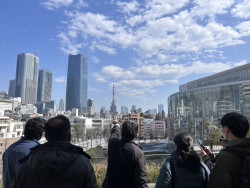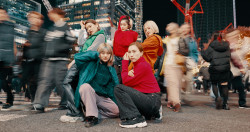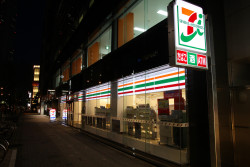
Originally published on metropolis.co.jp on August 2010

Photos by Dan Grunebaum
There was also plenty of emerging talent, and when I trundled off the Keiyo line at Kaihin-Makuhari station on day two of the festival, shaggy Brooklyn indie-rocker Darwin Deez was cavorting about the Dance Stage, his hook-filled, lo-fi songs sounding considerably more convincing through one of the massive PAs at the cavernous Makuhari convention center than they do on record. Accorded a generous reception, he’ll likely be back.
Also making their Japan debut, Manchester-influenced Brooklyn act The Drums were greeted by female screams of “Jo-na-san!!” Preternaturally self-aware frontman Jonathan Pierce answered their calls with prancing bows and a set of tight, Joy Division-meets-surf-rock tracks, including their hit “Best Friend.” Safe to say The Drums will be back as well.
Missing out on Sum 41—whose lead singer Deryck Whibley defied doctor’s orders not to perform after being involved in a brawl at a bar in Osaka—I opted for the brooding, leather-encrusted rock of Black Rebel Motorcycle Club and its near-polar opposite in the form of UK wunderkind Hudson Mohawke’s hyperactive electronica.
This gave way to the swaggering LA metal of Slash featuring Myles Kennedy, who obliged with a version of Guns N’ Roses’ “Nightrain.” But with Stevie Wonder beckoning, I soon left the cool shelter of Makuhari for the outdoor Marine Stadium. A bit overweight but with his voice and halo undiminished, the Motown legend was also in the mood to please, dusting off one hit after another, from “Superstition” to “Sir Duke”—and even tossing in a cover of The Beatles’ “We Can Work it Out.”
Not to be outdone, the Pixies closed Summer Sonic 2010 with their entire catalog of angular, proto-grunge classics, including “Monkey Gone to Heaven” and “Wave of Mutilation.” After plowing through these on autopilot, Frank Black and Kim Deal finally embraced the enthusiasm of the audience for an encore, the inevitable “Here Comes Your Man.”
[slideshow id=3 w=650 h=400]


Black Rebel Motorcycle Club
Metropolis spoke with Black Rebel Motorcycle Club’s Robert Levon Been and Leah Shapiro ahead of their set at Makuhari Messe.
Tell us about your Osaka gig.
Shapiro: It was good, but Japan is a bit overwhelming.
How does Osaka’s Summer Sonic compare to Tokyo’s?
Been: It’s more spread out. This one seems to be more contained. At Osaka you have to take a bus between stages.
How did the set go over?
Been: I didn’t hear any booing. Nobody threw anything at us so I’ll take that as a good sign.
The name “Black Rebel Motorcycle Club” conjures images of you pounding whiskey before your show. Is that a fantasy?
Shapiro: Well, look at us with our water and canned coffee.
Been: It’s a lovely fantasy—it’s been done before and will again.
Your name is evocative of debauchery and darkness…
Been: You need to have that stuff in life—there’s a lot of safe shit going on. The world has become too sterilized.
Do you find these festivals overly sterile?
Been: I can’t compare the Japanese ones to any others—it’s a different culture. But festivals are about corralling people into an area so they can do their debauchery on the weekend, and then go back to their regular job. It makes sense for the government to let that happen.
You’ve been together for a decade. Tell us about your relationship with Japan.
Been: It’s always interesting to come because it’s an interesting culture. But I’m not sure if the politeness is real or if it’s just because we are visitors. The response is very different. It’s hard to get used to the quietness between songs. Even the interviews are different. They ask very personal questions—like what do you spiritually before you go on stage? Whereas in Western cultures a typical question is, what does your bus look like now that you’re famous? I get a similar thing from the fans: there’s a respect for art here. I’m not sure I’m not getting lied to, but it’s amazing.
What song will you start your set with today?
Been: “Beat The Devil’s Tattoo,” the title track off our new album. We try to start with something that delivers a swift kick.
Tell us about the inspiration for the title.
Shapiro: I started reading Edgar Allen Poe for the first time since high school—I hadn’t read his stuff in ten years and bought this book of short stories and poems. Rob and I were living together at the time, and he picked it up and started reading it, and we ended up taking that bit from that book. It just happened to be around at the right time.
How was it working in a new band member?
Been: We’d been touring with Leah for five months. We went straight into a basement to start writing, and it was pretty easy and smooth. It just worked writing-wise as far as not having to talk about it too much.
How does a woman in the band change the dynamic?
Been: I don’t think it has changed that much. She’s great. There’s no princess thing going on. It’s a rock band. We don’t play dress up.
You’re used to being the sole female member of a rock band right?
Shapiro: Yeah, but it’s not something I’ve ever paid much attention to. We’re working on music and that’s the focus—not gender.
You’re approaching your 1000th gig. How do you make each one different?
Been: It really isn’t all that much. Dudes back in the day played a lot more, so we’ve got a lot of catching up to do. Life’s pretty easy.
